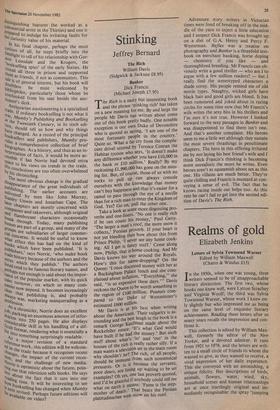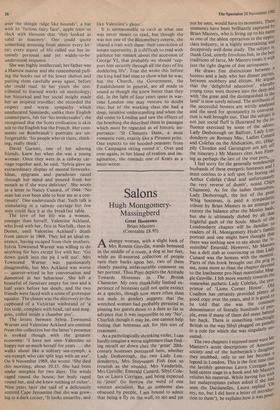Realms of gold
Elizabeth Jenkins
Letters of Sylvia Townsend Warner Edited by William Maxwell (Chatto & Windus £15)
In the 1930s, when one was young, three writers seemed to be of unapproachable literary distinction. The first two, whose books one knew well, were Lytton Strachey and Virginia Woolf; the third was Sylvia Townsend Warner, whose work I knew on- ly slightly but who impressed me as being on the same level of exquisite literary achievement. Reading these letters after so many years recalls the impression and con- firms it.
This collection is edited by William Max- well, formerly the editor of the New Yorker, and a devoted admirer. It runs from 1921 to 1978, and the letters are writ- ten to a small circle of friends to whom she wanted to give, as they wanted to receive, a vivid impression of her daily experience. This she conveyed with an astonishing, a unique felicity. Her descriptions of birds, animals, flowers, water, wind, sky, household scenes and human relationships are at once startlingly original and im- mediately recognisable: the spray 'jumping over the shingle ridge like hounds', a bat with its 'furious fairy face', apple trees so thick with blossom that 'they looked as solid as masonry'. One could quote something arresting from almost every let- ter; every aspect of life called out her in- tensely personal and yet widely-to-be- understood response.
She was highly intellectual; her father was a Harrow master and she remembered pull- ing the books out of his lower shelves and putting them carefully away again, before she could read. In her youth she con- tributed to learned works on musicology; her historical and her social insight made her an inspired traveller; she recorded the respect and warm sympathy which uneducated Spaniards, unlike their English counterparts, felt for 'los intelectuales' ; she recognised that the Scots civilisation is akin not to the English but the French. Her com- ments on Rembrandt's portraits are un- forgettable: 'his people who sit there, think- ing, really think'.
David Garnett, one of her adoring friends, knew her when she was a young woman. Once they were in a railway car- riage together and, he said, 'Sylvia gave an extraordinary display of mental fireworks. Ideas, epigrams and paradoxes raced through her mind and poured from her mouth as if she were delirious'. She wrote in a letter to Nancy Cunard, of 1944: 'No man has ever been able to bear me as a con- tinuity'. One understands that. Such talk is stimulating in a railway carriage but few men could face it at the breakfast table.
The love of her life was a woman, younger than herself, Valentine Ackland, who lived with her, first in Norfolk, then in Dorset, until Valentine Ackland's death from cancer in 1969. They led an ideal ex- istence, having escaped from their mothers. Sylvia Townsend Warner was willing to do anything for hers except live with her. 'Go down quick into the pit I will not'. Mrs Townsend Warner was passionately disagreeable, but Mrs Ackland was worse — quarter-witted in her conversation and demented in her behaviour. She left a houseful of furniture empty for two and a half years before her death, and the two friends were faced with a scene of grotesque squalor. The climax was the discovery in the cupboard of a Victorian washstand of 'a fox stole, complete with head, tail and mag- gots, coiled inside a chamber pot'.
The letters between Sylvia Townsend Warner and Valentine Ackland are omitted from this collection but the latter's presence is evoked though with the greatest economy: have not seen Valentine so happy nor so much herself for years . . . she walks about like a solitary sea-nymph, a sea-nymph who can split logs with an axe'. On 9 November 1969, she wrote: 'She died this morning, about 10.15. She had been under morphia for two days. The winds raged round the house, her body raged round her, and she knew nothing of either'. Nine years later she said of a deliciously scented Cape Jessamine that she was grow- ing in a dark corner, 'It looks unearthy, and like Valentine's ghost'.
It is unreasonable to cavil at what one was never meant to read, but though she was not one of the Bloomsbury coterie, she shared a trait with them: their conviction of innate superiority. It is difficult to read with patience her remark about the accession of George VI, that probably we should 'sup- port him securely through all the days of his doddering life'. True she wrote this before the king had had time to show what he was; but the Church, the Government, the Establishment in general, are all made to sound as though she knew better than they did. In the light of four years spent in war- time London one may venture to doubt this; but of the working class she had a deep, intuitive understanding and when she did come to London and saw the effects of the bombing she described them in passages which must be regarded as of historic im- portance: 'St Clements Dane, a most romantic ruin, exactly like a Piranesi print. One expects to see hooded• peasants from the Campagna sitting round it'. Over and over again, in her blend of realism and im- agination, she reminds one of Keats as a letter-writer.











































 Previous page
Previous page